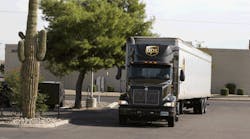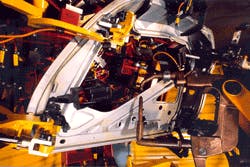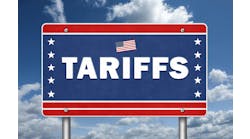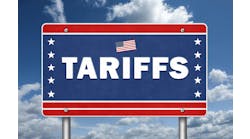How a Mexico City Auto Supplier Cut Cross-Border Shipment Time in Half
Comau Group, a Turin, Italy, division of FIAT, has 24 locations in 13 countries, but it was the robotic assembly facility in Mexico City that presented one of its more promising opportunities to combine logistics and manufacturing savings.
This site employs 250 employees devoted to assembling and testing robots used on automotive assembly lines throughout Central, South and North America. To be productive, Comau Group must navigate the intricacies and challenges of cross-border trade on an almost daily basis.
Specifically, Gustavo Ramos, import and export coordinator at this site, wanted to decrease the transit time of cross-border LTL shipments from Detroit, Mich., to Mexico City. This facility receives many of its assembly and automotive spare parts from manufacturers in Detroit via approximately 400 LTL shipments a year. Each shipment could take anywhere from six to seven days, with large lead times often resulting from complex customs regulations and multiple hand-offs at the U.S. and Mexico borders.
Typically, once a south-bound LTL shipment arrives at the U.S. border, the shipment is unloaded and released to a Mexican broker. After completing Mexican brokerage protocol, the shipment is then tendered to a third-party drayage provider (often working in tandem with the Mexican broker) to present the freight and documentation at the border gate.
After entering Mexico, the freight is then cross-docked and transferred to a Mexican trucking company for transportation to and final delivery in Mexico City. Multiple hand-offs like these not only slow down cross-border shipments, but also can increase security risks.
The longer it takes for shipments to move between Detroit and Mexico City, the greater the risk for production slow-downs or delays. Ramos felt his facility needed a faster service for some of its shipments, but wanted to avoid the cost of air freight.
Since Comau had a 10-year relationship with its transportation service provider, UPS, it explored the idea of using UPS CrossBorder Connect, a service that falls between traditional LTL ground service and air freight service.
Using this service, Comau’s LTL shipments from Detroit to Mexico City now take about three days. Most of the time savings come from the carrier’s ability to use team drivers and eliminate many of the processes and hand-offs that take place at the U.S.-Mexico border.
In Comau’s case, the freight is shipped via the ground network that supports UPS North American Air Freight from Detroit to Laredo. Rather than complete the Mexican brokerage process at the border, the freight moves in-bond directly to Mexico City where customs is cleared at the airport. UPS customers then have the option of working with their own Mexican customs broker, like Comau, or having UPS work on their behalf with a customs broker that falls within the UPS network.
“The greatest benefit we’ve seen with this service is really monetary,” said Ramos. “We were able to increase the speed of our cross-border shipments without impacting our bottom line. We began using it in the first quarter of 2012, and now our department uses it anytime we have a need for expedited service.”
Comau cut transit times of those shipments by 50 percent for shipments between the U.S. and Mexico.




